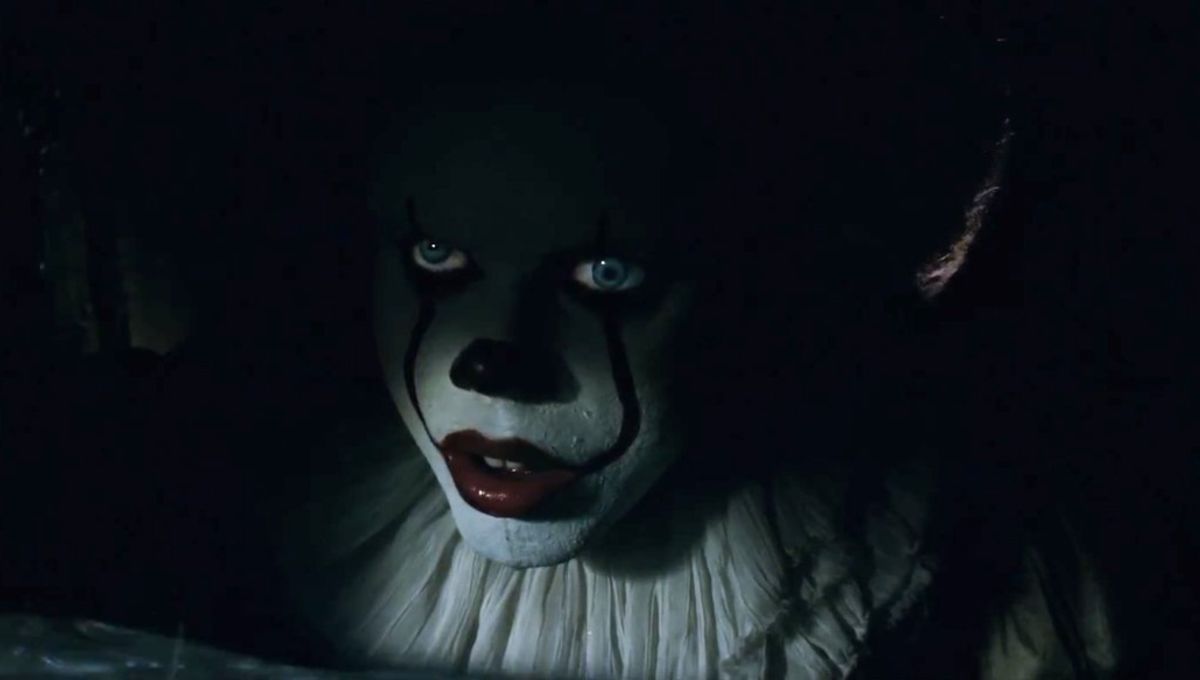It has been proven, most recently by last month's disastrous The Dark Tower, that there are no shortcuts when it comes to adapting Stephen King's doorstoppers: you go all in or go home. It, memorably, has been filmed once before at length, as a 1990 miniseries with VHS cover art (Tim Curry in full make-up as malevolent clown Pennywise) that loomed large over many teenage sleepovers. It, in its latest, cinematic iteration, arrives on the crest of a wave of breathless 1980s revivalism that has spawned the likes of the soon-to-be-a-major-motion-picture bestseller Ready Player One and the Netflix series Stranger Things (from which it snatches up one of its excellent young leads); it means there is a movie theatre playing Tim Burton's Batman in the background of its odd-numbered scenes, and fake Billy Idol or actual New Kids on the Block (which is more horrifying?) on the soundtrack of its even-numbered scenes. It has evidently been noted that there might be money in nostalgia. It the movie also emerges at a time when the predations of children's entertainers from this period are far more widely known and discussed: a metaphor lurking in the sewers on King's pages and on the small screen is now out in plain sight. It is a shade disappointing how underdeveloped it appears.
Its director is Andy Muschietti, the Argentine who held down a multiplex screen for a week or two with 2013's Mama, here seizing upon a known property and attempting something a little more marketable yet. It is quickly established that the sundappled Everytown of Derry is a cruel world: a place where nerdy, bookish, plain, plump, stuttery or otherwise maladroit kids are subjected to daily terrors both from without (fears about the AIDS epidemic) and within (playground bullies scarcely less vicious than the boogeymen stalking the town's peripheries). It is not so far, this Derry, from the Castle Rock of Rob Reiner's earlier King touchstone Stand by Me, especially when these boys are inspired by flame-haired group crush Beverly (Molly Ringwald-alike Sophia Lillis) to leap off a cliff into the lake below. It is the case that even the elders of this conservative backwater, distant and forbidding, come to be framed and lit like monsters: Beverly returns home from a skin-pricklingly uncomfortable encounter with a middle-aged pharmacist to a single father who possibly spies the Tampax this Carrie-at-large been shopping for and whispers "Tell me you're still my little girl." It may be no coincidence that the miniseries debuted in the final year of Reagan's family values-hawking administration, and the first season of a show called Twin Peaks.
It will, however, be the sorry fate of every audiovisual artefact released in 2017 to be compared - and, in the main, compared unfavourably - to what David Lynch has achieved over the past four months on TV, and setting It against Twin Peaks: The Return, you soon realise there are significant differences between what teenagers find scary and what grown-ups find scary, between a carnival barker like Muschietti and a dreamweaver such as Lynch. It's clown, certainly, is a superficially unsettling presence as embodied by Bill Skarsgard, lurking on riverbanks (a crib from The Innocents, maybe?) and erupting out of slide projections, as Curry once seemed to from Rediffusion television sets; he even seems promisingly toothy upon ripping off a small child's arm during the opening sequence. It eventually becomes apparent, though, that - unlike the monsters in The Return, who look to have emerged from the bowels of the universe in order to tell us something dire about that universe - Muschietti's Pennywise has no greater depth or meaning than that original cover art: he's just a creep who happens to have spent a lot of time in wardrobe and post-production. It's treatment of rape and paedophilia are almost wholly glib; its allusions to The Frog Prince, which a Guillermo del Toro might have flooded with emotion, are finally handled rather jokily, undermining whatever impact they might have had.
It 2017 - forever more 15 than 18, succumbing to and perpetuating that cosy nostalgia the new Peaks spent so long resisting and refuting - is not a movie about the real evils at large in the world and its entertainment industry, but a movie about all the pop culture its makers and audience have consumed over the years, up to and including It the miniseries. It depends on us finding clowns terrifying because TV and the movies have told us clowns are terrifying, whereas it seems to me that clowns are only really about as terrifying as, say, Dermot O'Leary. It can still be enjoyed as a broadly proficient popcorn movie, shuttling us from one setpiece to the next as if that was all King were good for, and - who knows? - if you were thirteen or fourteen, its jolts may help bring you a little closer to the girl or boy you snuck into the Cineworld to see it with. It is, however, just another in a now very long line of latter-day Hollywood funhouses: you go in, get amused or rattled by the ooky sights popping out of the woodwork, and come out barely remembering a damn thing about it, your pockets ten pounds, dollars or Euros lighter. It naturally, as product, leaves the door open for the possibility of a sequel, with a creak not quite loud enough to cover any yawns or sighs.
It: Chapter One opens in cinemas nationwide from Friday.

No comments:
Post a Comment